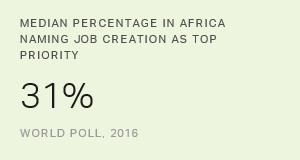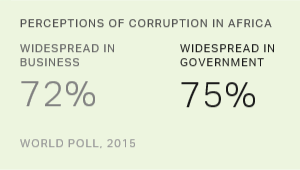Story Highlights
- Reported assaults, robberies among highest in sub-Saharan Africa
- Less than half feel safe walking alone at night
- At least two in three in each country worry a lot daily
WASHINGTON, D.C. -- Improving security is among the top issues that residents in war-torn Central African Republic (CAR) and South Sudan want their governments to tackle in the coming year. Reeling from years of civil war and ongoing violence and insecurity, 54% of those surveyed in CAR and 19% of those surveyed in South Sudan name security as the most important issue.

For the past several years, civil wars in CAR and South Sudan have led to extreme violence, mass killings and the consequential involvement of international United Nations peacekeeping missions. The situation remains extremely critical, and violence has escalated recently. This week, the U.N. issued a warning about the risk of genocide in South Sudan, and it also recently reported various types of killings, inhumane treatment and sexual abuse throughout CAR. Because of insecurity, Â鶹´«Ã½AV made several geographic exclusions that represented 44% of the population in South Sudan and 40% in CAR.
In both countries, urban residents are somewhat more likely than those in rural areas to be concerned with security issues. Almost four in 10 urban residents (38%) in South Sudan mention improving security as the main priority, while 11% mention improving agriculture. Among those in rural areas, 25% cite improving agriculture and 16% choose security. Such views are set against a backdrop of a developing famine in South Sudan, which is related to growing violence in agriculture-rich regions in the past six months. In CAR, 59% of urban residents mention security as the government's main priority, while 50% of rural residents say the same.
Crime Victimization Among Highest in Sub-Saharan Africa
These feelings of insecurity are further illustrated by the relatively high percentages of people in both countries who report having been victims of assaults and robberies in the past year. Nearly one in four in CAR and South Sudan report being assaulted in the past year, and 36% and 46%, respectively, report having money or property stolen in the past year. Both figures are some of the highest across sub-Saharan Africa in 2016.
| Money/Property stolen in past 12 months | Assaulted in past 12 months | ||||||||||||||||||||||||||||||||||||||||||||||||||||||||||||||||||||||||||||||||||||||||||||||||||
|---|---|---|---|---|---|---|---|---|---|---|---|---|---|---|---|---|---|---|---|---|---|---|---|---|---|---|---|---|---|---|---|---|---|---|---|---|---|---|---|---|---|---|---|---|---|---|---|---|---|---|---|---|---|---|---|---|---|---|---|---|---|---|---|---|---|---|---|---|---|---|---|---|---|---|---|---|---|---|---|---|---|---|---|---|---|---|---|---|---|---|---|---|---|---|---|---|---|---|---|
| % | % | ||||||||||||||||||||||||||||||||||||||||||||||||||||||||||||||||||||||||||||||||||||||||||||||||||
| Uganda | 49 | 23 | |||||||||||||||||||||||||||||||||||||||||||||||||||||||||||||||||||||||||||||||||||||||||||||||||
| South Sudan | 46 | 24 | |||||||||||||||||||||||||||||||||||||||||||||||||||||||||||||||||||||||||||||||||||||||||||||||||
| Malawi | 43 | 10 | |||||||||||||||||||||||||||||||||||||||||||||||||||||||||||||||||||||||||||||||||||||||||||||||||
| Sierra Leone | 43 | 22 | |||||||||||||||||||||||||||||||||||||||||||||||||||||||||||||||||||||||||||||||||||||||||||||||||
| Liberia | 43 | 27 | |||||||||||||||||||||||||||||||||||||||||||||||||||||||||||||||||||||||||||||||||||||||||||||||||
| South Africa | 37 | 19 | |||||||||||||||||||||||||||||||||||||||||||||||||||||||||||||||||||||||||||||||||||||||||||||||||
| Zambia | 36 | 16 | |||||||||||||||||||||||||||||||||||||||||||||||||||||||||||||||||||||||||||||||||||||||||||||||||
| Central African Republic | 36 | 23 | |||||||||||||||||||||||||||||||||||||||||||||||||||||||||||||||||||||||||||||||||||||||||||||||||
| Rwanda | 36 | 12 | |||||||||||||||||||||||||||||||||||||||||||||||||||||||||||||||||||||||||||||||||||||||||||||||||
| Kenya | 35 | 19 | |||||||||||||||||||||||||||||||||||||||||||||||||||||||||||||||||||||||||||||||||||||||||||||||||
| Botswana | 35 | 12 | |||||||||||||||||||||||||||||||||||||||||||||||||||||||||||||||||||||||||||||||||||||||||||||||||
| Tanzania | 31 | 5 | |||||||||||||||||||||||||||||||||||||||||||||||||||||||||||||||||||||||||||||||||||||||||||||||||
| Senegal | 29 | 5 | |||||||||||||||||||||||||||||||||||||||||||||||||||||||||||||||||||||||||||||||||||||||||||||||||
| Chad | 29 | 17 | |||||||||||||||||||||||||||||||||||||||||||||||||||||||||||||||||||||||||||||||||||||||||||||||||
| Nigeria | 28 | 20 | |||||||||||||||||||||||||||||||||||||||||||||||||||||||||||||||||||||||||||||||||||||||||||||||||
| Ghana | 26 | 16 | |||||||||||||||||||||||||||||||||||||||||||||||||||||||||||||||||||||||||||||||||||||||||||||||||
| Gabon | 25 | 13 | |||||||||||||||||||||||||||||||||||||||||||||||||||||||||||||||||||||||||||||||||||||||||||||||||
| Zimbabwe | 24 | 7 | |||||||||||||||||||||||||||||||||||||||||||||||||||||||||||||||||||||||||||||||||||||||||||||||||
| Burkina Faso | 24 | 9 | |||||||||||||||||||||||||||||||||||||||||||||||||||||||||||||||||||||||||||||||||||||||||||||||||
| Guinea | 24 | 9 | |||||||||||||||||||||||||||||||||||||||||||||||||||||||||||||||||||||||||||||||||||||||||||||||||
| Lesotho | 23 | 8 | |||||||||||||||||||||||||||||||||||||||||||||||||||||||||||||||||||||||||||||||||||||||||||||||||
| Togo | 22 | 10 | |||||||||||||||||||||||||||||||||||||||||||||||||||||||||||||||||||||||||||||||||||||||||||||||||
| Congo (Kinshasa) | 21 | 15 | |||||||||||||||||||||||||||||||||||||||||||||||||||||||||||||||||||||||||||||||||||||||||||||||||
| Mauritania | 20 | 8 | |||||||||||||||||||||||||||||||||||||||||||||||||||||||||||||||||||||||||||||||||||||||||||||||||
| Madagascar | 19 | 5 | |||||||||||||||||||||||||||||||||||||||||||||||||||||||||||||||||||||||||||||||||||||||||||||||||
| Cameroon | 17 | 16 | |||||||||||||||||||||||||||||||||||||||||||||||||||||||||||||||||||||||||||||||||||||||||||||||||
| Congo (Brazzaville) | 17 | 11 | |||||||||||||||||||||||||||||||||||||||||||||||||||||||||||||||||||||||||||||||||||||||||||||||||
| Benin | 17 | 9 | |||||||||||||||||||||||||||||||||||||||||||||||||||||||||||||||||||||||||||||||||||||||||||||||||
| Mali | 16 | 6 | |||||||||||||||||||||||||||||||||||||||||||||||||||||||||||||||||||||||||||||||||||||||||||||||||
| Ivory Coast | 15 | 7 | |||||||||||||||||||||||||||||||||||||||||||||||||||||||||||||||||||||||||||||||||||||||||||||||||
| Somalia | 14 | 6 | |||||||||||||||||||||||||||||||||||||||||||||||||||||||||||||||||||||||||||||||||||||||||||||||||
| Niger | 11 | 10 | |||||||||||||||||||||||||||||||||||||||||||||||||||||||||||||||||||||||||||||||||||||||||||||||||
| Ethiopia | 9 | 6 | |||||||||||||||||||||||||||||||||||||||||||||||||||||||||||||||||||||||||||||||||||||||||||||||||
| Mauritius | 6 | 1 | |||||||||||||||||||||||||||||||||||||||||||||||||||||||||||||||||||||||||||||||||||||||||||||||||
| Â鶹´«Ã½AV World Poll, 2016 | |||||||||||||||||||||||||||||||||||||||||||||||||||||||||||||||||||||||||||||||||||||||||||||||||||
The high victimization rates amid the instability in these two countries help explain why less than 50% in either country say they feel safe walking alone at night in the city or area where they live. In CAR, those who report having been assaulted in the past year are far less likely to say they feel safe walking alone at night (28%) than are those who say they have not been assaulted (46%).
Both Countries Not Particularly Hospitable to Minorities
The most recent Â鶹´«Ã½AV data reflect the degradation of the acceptance of ethnic minorities in Central African Republic. In 2016, 48% of adults in CAR said their community is a good place for racial or ethnic minorities to live, compared with 74% in 2011. In South Sudan, the percentage is also relatively low, at 43% in 2016. These percentages are among the lowest rates in sub-Saharan Africa.
In CAR, the change in perceptions toward ethnic minorities from 2011 to 2016 is striking. In 2016, 45% of urban residents say their area is a good place for ethnic minorities, compared with 64% in 2011. In rural areas, such attitudes dropped from 76% to 50%.
| Urban | Rural | ||||||||||||||||||||||||||||||||||||||||||||||||||||||||||||||||||||||||||||||||||||||||||||||||||
|---|---|---|---|---|---|---|---|---|---|---|---|---|---|---|---|---|---|---|---|---|---|---|---|---|---|---|---|---|---|---|---|---|---|---|---|---|---|---|---|---|---|---|---|---|---|---|---|---|---|---|---|---|---|---|---|---|---|---|---|---|---|---|---|---|---|---|---|---|---|---|---|---|---|---|---|---|---|---|---|---|---|---|---|---|---|---|---|---|---|---|---|---|---|---|---|---|---|---|---|
| % Good place | % Good place | ||||||||||||||||||||||||||||||||||||||||||||||||||||||||||||||||||||||||||||||||||||||||||||||||||
| South Sudan | 38 | 44 | |||||||||||||||||||||||||||||||||||||||||||||||||||||||||||||||||||||||||||||||||||||||||||||||||
| Central African Republic | 45 | 50 | |||||||||||||||||||||||||||||||||||||||||||||||||||||||||||||||||||||||||||||||||||||||||||||||||
| Â鶹´«Ã½AV World Poll, 2016 | |||||||||||||||||||||||||||||||||||||||||||||||||||||||||||||||||||||||||||||||||||||||||||||||||||
In the current climate, residents in both countries have a great deal to worry about -- and they do. In both countries, at least two in three say they experienced worry a lot of the previous day.
Bottom Line
Perceptions of insecurity in CAR and South Sudan are similar. These results underscore the ongoing dire situation that pervades in both countries. That the findings exclude populations who live in the most unsafe areas makes these results even more striking.
These data are available in .
Survey Methods
Results are based on face-to-face interviews with 1,000 adults, aged 15 and older, conducted June 29-July 12, 2016, in Central African Republic and 1,000 adults, aged 15 and older, conducted April 14-May 27, 2016, in South Sudan. For results based on the total sample of national adults, one can say with 95% confidence that the maximum margin of sampling error is ±3.8 percentage points. The margin of error reflects the influence of data weighting. In addition to sampling error, question wording and practical difficulties in conducting surveys can introduce error or bias into the findings of public opinion polls. Finally, because of insecurity reasons, the geographic exclusions represent about 40% of the estimated national population in Central African Republic and 44% of the estimated national population in South Sudan.
Learn more about how the works.



